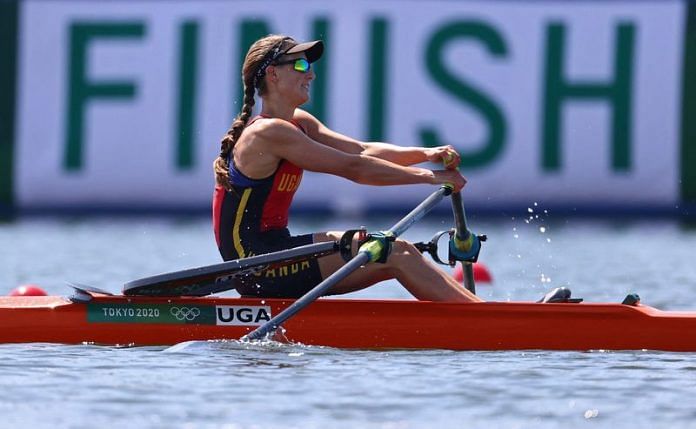Rower Kathleen Noble knows she will not be a medal contender when she competes for Uganda at the Paris Olympics but the 29-year-old with Irish roots nonetheless embodies the principles of Olympism.
Noble will be competing in her second Games for the east African nation in the women’s single sculls and while she is not aiming for the podium she is training diligently despite her amateur status to do the best she can.
“The goal for me is less performative in the sense of which position do I want to get to and more centred around how do I execute the best race that I can,” she told Reuters in an interview.
Noble is a latecomer to the sport, rowing for only a decade after first representing Uganda at swimming.
She was born in Kampala to Irish missionaries, her father a doctor and mother a teacher who have lived in Uganda for the past 31 years.
“When we grew up in Uganda people asked where I was from and I’d say ‘Ireland’. But then when I was on holiday in Ireland, people asked me where I was from and I’d say ‘Uganda’.”
Now she lives in Knoxville, Tennessee, juggling work as a software engineer with her Olympic training.
“Uganda is a lovely place to grow up and I miss it. Representing Uganda has had a key role in my identifying as Ugandan. That has kind of forced me to step up to the plate a little bit and be like, ‘yes, this is my country’, and I feel closer to it for it.”
She broke Ugandan swimming records while at high school in the Ugandan capital and went to the world short course swimming championship in Istanbul in 2012 as a 17-year-old.
“When I finished high school, I was kind of done with swimming and wasn’t really thinking of continuing. I kind of felt like going to the World Championships was a capstone to that career and something I was very happy with.”
Instead, she went to study at Princeton University where her room mate was on the rowing team.
“I found that I was missing sport and so she was kind of like, ‘maybe you should try out rowing’ and I’m like, ‘okay, maybe I’ll try out’.
OPPORTUNITY TO COMPETE
“The reason that I joined was because I wanted to exercise, I wanted a team, I wanted the opportunity to compete, and I wanted to be outdoors. And then I found that I really enjoyed the rowing part of it. And I was quite good at it.”
Fortuitously, her time in the varsity boat coincided with a visit to the school by Uganda’s rowing coach and quickly a connection was made.
“It had never occurred to me before that I could compete in international competition.”
She went to the under-23 world championship in Rotterdam in 2016 and then, after completing her studies and working in Utah, to the Tokyo Olympics, finishing 26th in a 32-women field.
“Tokyo was a very restricted experience, because of COVID-19. For me, the primary emotion was just relief, because there were so many steps along the way, where it seemed like it wasn’t going to happen. I’m very excited for Paris and the full experience of having spectators and drawing from that energy. It definitely has been one of the factors that drove me to go for a second Games.”
FLEXIBILITY
Noble trains at a club in Knoxville, with some flexibility in her workday schedule.
Striving for excellence is the first principle of Olympism, the philosophy that underpins the Games, and for Noble that means understanding the limitations of being an amateur athlete.
“The attitude that I’ve taken towards my training at this point is that I want to do the best that I can within the constraints that I have. And to recognise that, I’m not in a position of being a full-time professional athlete, and that is okay.
“At this point in my life, it is very important to me that I have a career. My pursuit of athletics and the Olympics has slowed that kind of progress, which is a tradeoff that I’m okay with making.”
She will stop after the Games because she also wants to start a family but aims to help develop the sport in Uganda, where her profile has been vastly increased since Tokyo.
“We have a vision of setting up a High Performance Centre in Uganda. I feel like I’ve been given so many opportunities, and I feel that I want to take those and reflect them back or allow those to be an avenue through which other people can have opportunities.”
(Editing by Toby Davis)
Disclaimer: This report is auto generated from the Reuters news service. ThePrint holds no responsibilty for its content.






